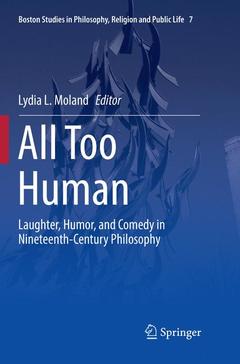All Too Human, 1st ed. 2018 Laughter, Humor, and Comedy in Nineteenth-Century Philosophy Boston Studies in Philosophy, Religion and Public Life Series, Vol. 7
Coordonnateur : Moland Lydia L.

Lydia L. Moland is Associate Professor of Philosophy at Colby College. She is the author of "Hegel on Political Identity: Patriotism, National Identity, Cosmopolitanism" and of numerous articles on Hegel’s political philosophy and philosophy of art. She has been a recipient of fellowships from the American Academy of Berlin, the DAAD, the American Council of Learned Societies, and the National Endowment for the Humanities.
Date de parution : 02-2019
Ouvrage de 198 p.
15.5x23.5 cm
Disponible chez l'éditeur (délai d'approvisionnement : 15 jours).
Prix indicatif 105,49 €
Ajouter au panierDate de parution : 09-2018
Ouvrage de 198 p.
15.5x23.5 cm
Thème d’All Too Human :
Mots-clés :
Aesthetic Philosophies of Friedrich Schlegel; Aesthetic Philosophies of Hegel; Aesthetic Philosophies of Kierkegaard; Aesthetic Philosophies of Nietzsche; Aesthetic Philosophies of Schopenhauer; German Idealism; German Romanticism; Philosophy of Comedy; Philosophy of Humor; Philosophy of Laughter



